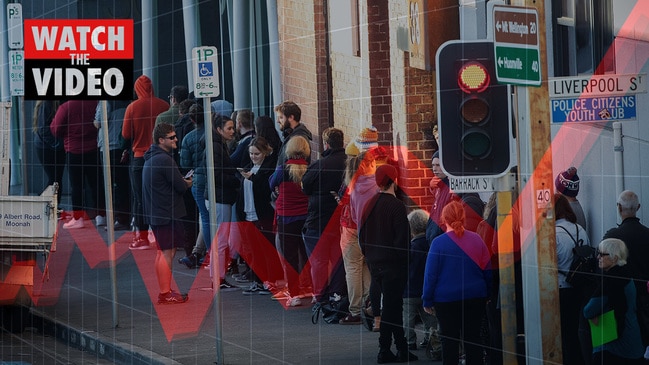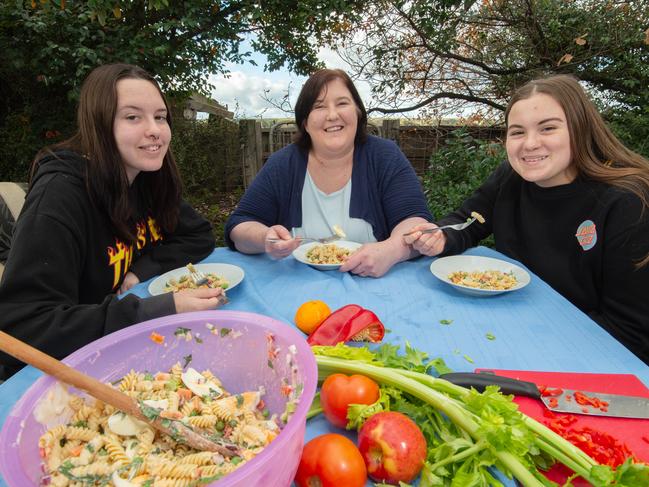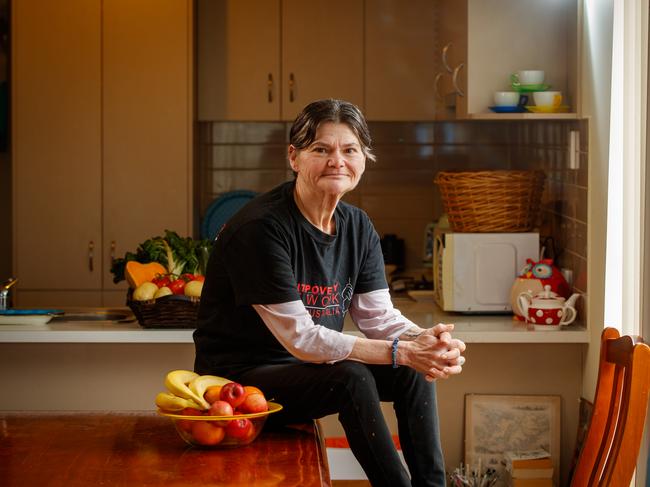Why jobless have enough for the basics during COVID-19 pandemic
Government allowances have helped many jobless Australians stay above the poverty line. Here’s how the payments have helped steer some away from struggle street.

Health
Don't miss out on the headlines from Health. Followed categories will be added to My News.
Exclusive: Many Aussies looking for work during COVID-19 are better off now compared to pre-pandemic payments.
The pandemic payouts from Government allowances have lifted the numbers of people over the poverty line and allowed many families to eat fruit and vegetables daily, buy medication and have three meals a day for the first time.
The supplements have doubled allowances previously received by students, workers and other people on benefits, including JobSeeker, meaning they are not living from payday to payday.
The Australian Council for Social Services says unless the $550 a fortnight coronavirus Supplement remains, millions of Australians will be catapulted back into the poverty cycle in September.

“We can’t go back to where we were – when people were struggling to survive on $40 per day which is just not enough to live, let alone to cover the basics,” said Australian Council of Social Service CEO Dr Cassandra Goldie.
“A permanent increase to JobSeeker and Youth Allowance that allows people to cover the basics of life, including putting food on the table and a roof over a head, is not only the right thing to do but the smart thing to do.
“Leaving almost two million people on JobSeeker or Youth Allowance without enough to cover the basics would be a disaster for the economy as we try to rebuild out of this crisis.”
As of last month there were 1.64 million people on JobSeeker and economic data from economic advisory firm Alpha Beta’s shows the coronavirus supplement and access to superannuation has boosted spending to a level just four per cent below pre-COVID levels.

A landmark report from The Australian Council for Social Services (ACOSS) surveyed nearly 1000 people and found 75 per cent can now catch-up on bills, 69 per cent are finding it easier to pay their rent, or were considering moving into safer or more appropriate accommodation, 61 per cent reported that they were better able to cover the cost of emergency expenses and 59 per cent were now able to save up for major household items like fridges and freezers.
ACOSS also found the number of people skipping meals because of a lack of funds had dropped by over half, 93 per cent can now afford more fresh fruit and vegetables, and 86 per cent reporting that they can afford more meat.
The number of people reporting that they were struggling with medical costs had dropped by over 40 per cent and 83 per cent reported they were eating better.

CEO Donna Bennett from Hope Street Youth and Family Services said permanently increasing welfare rates could be a buffer in preventing homelessness in young families who then have far more options to secure their future.
“With the increased payment, young people are now more likely to be able to secure and obtain private rental accommodation as a viable option to exit out of homelessness.

“They are also more likely to be able to afford items required to search for and secure employment, such as clothing and personal care items to assist with presentation at interviews, public transport to attend interviews and data to search for jobs online.”
PANDEMIC BRINGS EXTRA ‘LUXURIES’
Before the pandemic Melbourne mother of two Mandy Weber was living paycheck to paycheck, surviving off her wage as a chef and some government payments. Formally a chef in the Australian Army, low wages and a relationship breakdown meant she found herself needing to accept help just to keep a roof over her head and her two daughters fed.
Despite losing her job in the pandemic the extra payments have meant ‘luxuries’ like three full meals a day and haircuts.
“I was able to buy a blanket for each of our beds. I could buy the girls’ shoes for school that didn’t have holes in them and warmer coats. And they could have their hair cut – that doesn’t sound like a big thing but for them it was absolutely amazing.”
Ms Weber is worried when the payments stop in September that it will mean she is back to skipping meals in order to have enough food for her children to eat and that, even with her set of skills, she will struggle to get a job along with countless other job seekers.
“We could end up homeless, I am really worried. It keeps me awake at night, we are fighting hard to keep their education; we want Olivia to go to university next year,” she said.
“I am pushing hard for my girls to have a different life. I didn’t end up on Centrelink by choice.”
MORE MONEY MEANS BETTER MEALS
Paulene Hutton from Redcliffe is a single parent who lost her job working in a dress shop. With a son with severe autism and a daughter who is home schooled due to serious anxiety, Paulene says the extra payments have transformed their lives.
“Our diet is amazing now, previously we just filled up on bread and potatoes because they are cheap but now we have more red meat in our diet, and not just cheap drumsticks and chicken wings.”

“Even just yesterday I had to go buy something for the house that had broken and it was the day before payday but I had the $10 that I needed. It doesn’t sound like much but it is when you are on a fixed income the only movement you have is your food budget.
“Being able to make full meals is a godsend, I haven’t missed a meal since the supplement happened.”
Ms Hutton said the additional money has also meant she was able to catch up on overdue bills and buy her daughter some basics from the local department store.
“She had a growth spurt and I was able to buy her two pairs of tights and a few T-shirts rather than go through the 50 cent bin a the charity shop and she could pick the colours she wanted. It made a big difference to her, she felt special.”
EXTRA PAYMENTS MAKE HUGE DIFFERENCE
South Australian Rita McDonald, 55, says the doubling of her payments has dramatically transformed her daily life.
“My fridge is full, my freezer is full – I can eat every day, mostly three meals a day. Before I usually only ate one meal per day and there were always three or four days in the fortnight when I wouldn’t eat at all.
“Because I wasn’t eating well, I became ill – and with the added stress, developed mental health issues. It’s a vicious cycle.
“Another huge difference is that I can now afford sanitary items and cosmetics like shampoo, moisturiser, deodorant – these were all luxuries I did without for years.
“I can also finally go on an electricity plan to pay off my electricity debt, and I’m thinking about applying for a No Interest Loan through Good Shepherd to get a new fridge.”
LESS STRESS FOR STUDENT
Avery Howard, 19, used to receive $460 per fortnight, and with the Supplement he is now receiving $1020 before rent.
The teenager is studying in the hopes of becoming a maths teacher but with no financial support from his family is living in community housing
“I used to stress about how little money I had – if I could eat, if I needed to save to pay bills
“I still skip meals, because I’ve gotten used to not eating three meals a day. I have a midmorning meal and a midafternoon to evening meal, I wouldn’t call them ‘lunch’ or ‘dinner’.
“With the extra payment I’ve been able to buy clothes, to regularly buy fresh fruit and vegetables, and meat – I’ve been able to put some mince in my freezer for the first time.”
“I was able to complete a Responsible Service of Alcohol (RSA) course, it cost $200 and I couldn’t cover the cost before. Hopefully I will be able to get a job with that.”
